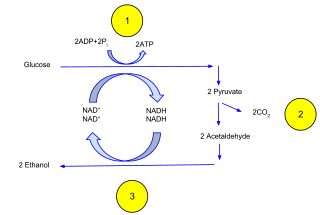
The Archer-Daniels-Midland Company, commonly known as ADM, is an American multinational food processing and commodities trading corporation founded in 1902 and headquartered in Chicago, Illinois. The company operates more than 270 plants and 420 crop procurement facilities worldwide, where cereal grains and oilseeds are processed into products used in food, beverage, nutraceutical, industrial, and animal feed markets worldwide.

Ethanol fermentation, also called alcoholic fermentation, is a biological process which converts sugars such as glucose, fructose, and sucrose into cellular energy, producing ethanol and carbon dioxide as by-products. Because yeasts perform this conversion in the absence of oxygen, alcoholic fermentation is considered an anaerobic process. It also takes place in some species of fish where it provides energy when oxygen is scarce.
Cellulosic ethanol is ethanol produced from cellulose rather than from the plant's seeds or fruit. It can be produced from grasses, wood, algae, or other plants. It is generally discussed for use as a biofuel. The carbon dioxide that plants absorb as they grow offsets some of the carbon dioxide emitted when ethanol made from them is burned, so cellulosic ethanol fuel has the potential to have a lower carbon footprint than fossil fuels.

The economy of Illinois is the fifth largest by GDP in the United States and one of the most diversified economies in the world. Fueled by the economy of Chicago, the Chicago metropolitan area is home to many of the United States' largest companies, including Abbott Laboratories, AbbVie Inc., Allstate, Baxter International, Conagra, Crate and Barrel, Kraft Heinz, McDonald's, CNH Industrial, GE Healthcare, Aon PLC, Willis Towers Watson, Mondelez International, Motorola, United Airlines, US Foods, Walgreens, and more. The Chicago area is a global financial center and headquarters a wide variety of financial institutions including Citadel LLC, CNA Financial, Discover Financial Services, Morningstar, Inc., Nuveen, and more. Chicago is also home to the largest futures exchange in the world, the Chicago Mercantile Exchange.

Distillers grains are a cereal byproduct of the distillation process. Brewer's spent grain usually refers to barley produced as a byproduct of brewing, while distillers grains are a mix of corn, rice and other grains.
Xethanol AMEX: XNL was one of the smaller producers of corn ethanol in the United States, and one of the few publicly traded companies developing technology for producing cellulose ethanol. Ethanol fuel will have increased production from a current level of about 5 billion US gallons (19,000,000 m3) per year to over 20 billion US gallons (76,000,000 m3) annually. Potentially 60 to 100 billion US gallons of ethanol could be produced annually in a sustainable manner from domestic biomass resources. To achieve these goals some believe it will be necessary to develop and commercialize technology for the production of ethanol from cellulose and hemicellulose. Xethanol says it plans to increase production and profitability with new technology it has under development.

The Renewable Fuels Association (RFA) represents the ethanol industry promoting policies, regulations, and research and development initiatives that will lead to the increased production and use of ethanol fuel. First organized in 1981, RFA serves as a voice of advocacy for the ethanol industry, providing research data and industry analysis to its members, to the public via the media, to the United States Congress, as well as to related federal and state agencies.
In order to create ethanol, all biomass needs to go through some of these steps: it needs to be grown, collected, dried, fermented, and burned. All of these steps require resources and an infrastructure. The ratio of the energy released by burning the resulting ethanol fuel to the energy used in the process, is known as the ethanol fuel energy balance and studied as part of the wider field of energy economics. Figures compiled in a 2007 National Geographic Magazine article point to modest results for corn (maize) ethanol produced in the US: 1 unit of energy input equals 1.3 energy units of corn ethanol energy. The energy balance for sugarcane ethanol produced in Brazil is much more favorable, 1 to 8. Over the years, however, many reports have been produced with contradicting energy balance estimates. A 2006 University of California Berkeley study, after analyzing six separate studies, concluded that producing ethanol from corn uses marginally less petroleum than producing gasoline.
The United States produces mainly biodiesel and ethanol fuel, which uses corn as the main feedstock. The US is the world's largest producer of ethanol, having produced nearly 16 billion gallons in 2017 alone. The United States, together with Brazil accounted for 85 percent of all ethanol production, with total world production of 27.05 billion gallons. Biodiesel is commercially available in most oilseed-producing states. As of 2005, it was somewhat more expensive than fossil diesel, though it is still commonly produced in relatively small quantities.

Corn ethanol is ethanol produced from corn biomass and is the main source of ethanol fuel in the United States, mandated to be blended with gasoline in the Renewable Fuel Standard. Corn ethanol is produced by ethanol fermentation and distillation. It is debatable whether the production and use of corn ethanol results in lower greenhouse gas emissions than gasoline. Approximately 45% of U.S. corn croplands are used for ethanol production.
VeraSun Energy Corporation was a leading producer of renewable fuel. Founded in 2001, the company at one time had a fleet of 16 production facilities in eight states, of which one was still under construction. VeraSun Energy was scheduled to have an annual production capacity of approximately 1.64 billion US gallons (6,200,000 m3) of ethanol and more than 5 million tons of distillers grains by the end of 2008. The company also had begun construction at its Aurora, South Dakota facility to extract oil from dried distillers grains, a co-product of the ethanol process, for use in biodiesel production.
China has set the goal of attaining one percent of its renewable energy generation through bioenergy in 2020.
Fox River Valley Ethanol is a privately owned ethanol fuel plant located in Oshkosh, Wisconsin. Opened in the spring of 2003 by Utica Energy, the plant produces 52 million gallons of corn based fuel-grade ethanol yearly. Aside from ethanol, Fox River Valley Ethanol produces a number of high quality by-products such as CO2, corn oil, and wet and dried distillers grains. Corn is provided to the plant by GB Elevator, and is sourced from local and regional corn producers. The plant was designed by Delta-T Corp.
POET LLC is a U.S. biofuel company that specializes in the creation of bioethanol. The privately held corporation, which was originally called Broin Companies, is headquartered in Sioux Falls, South Dakota. In 2007, the Renewable Fuels Association named POET the largest U.S. ethanol producer, creating 1.1 billion US gallons (4,200,000 m3) of fuel per year. POET currently produces 3 billion gallons of ethanol per year, or 19% of all ethanol produced in the United States.
Amyris Fuels, LLC, is a wholly owned subsidiary of Amyris, a business unit formed to develop a network for supplying and distributing renewable fuels. The company sources current biofuels, such as ethanol, from international producers and brings them to market.

The Andersons, Inc. is an American agribusiness established in 1947, that began as Andersons Truck Terminal (ATT) in the 1940s for the grain industry, headquartered in Maumee, Ohio. It is a diversified company rooted in agriculture that conducts business in the commodity merchandising, renewables, and plant nutrient sectors.

Gevo, Inc. is an American renewable chemicals and advanced biofuels company headquartered in unincorporated Douglas County, Colorado, in the Denver-Aurora metropolitan area. Gevo operates in the sustainability sector, pursuing a business model based on the concept of the "circular economy". The company develops bio-based alternatives to petroleum-based products using a combination of biotechnology and classical chemistry. Gevo uses the GREET model from Argonne National Laboratory as a basis for its measure of sustainability with the goal of producing high-protein animal feed, corn-oil products, and energy-dense liquid hydrocarbons. Gevo is focused on converting sustainably grown raw materials, specifically No. 2 dent corn, into high-value protein and isobutanol, a primary building block for renewable hydrocarbons, including sustainable aviation fuel, renewable gasoline, and renewable diesel. Gevo markets these fuels as directly integrable on a “drop-in” basis into existing fuel and chemical products. Gevo's investors include Burrill & Company, Khosla Ventures, Lanxess, Osage University Partners, Total, and Virgin Green Fund, among others.
Green Plains is an American company based in Omaha, Nebraska that was founded in 2004. The company is the third largest ethanol fuel producer in North America. It was reported in early 2012 that the company ships approximately one billion gallons of ethanol per year. The company employs approximately 640 people, and was founded by Barry Ellsworth. Green Plains Inc. is listed on the NASDAQ Stock Exchange as GPRE.
REX American Resources Corp. is an American producer and retailer of ethanol, distillers grains and natural gas as well as a holding company in energy entities. It was founded in 1980 and is headquartered in Dayton, Ohio. The company has the entire ownership of three affiliated corporations including Rex Radio and Television, Inc., Stereo Town, Inc. and Kelly & Cohen Appliances, Inc. As of 2012, the company has the ownership of 22 national retail stores and invested in five ethanol production entities nationwide. One of the plants the company invested in, One Earth Energy, LLC, has an annual capacity of 100 million gallons of ethanol and 320,000 tons of dried distillers grains. The company exited the retail industry and transferred to energy investment in 2009 with changing the name from Rex Stores Corporation to its current name in the following year.

The D&I Railroad (DAIR) is a Class III shortline railroad which is a wholly owned subsidiary of L. G. Everist, Inc. The line hauls ethanol, dried distillers grains (DDG), corn oil, plastic pellets, cement, sand, gravel, and Sioux Quartzite, which is mined from two large quarries in Dell Rapids.








